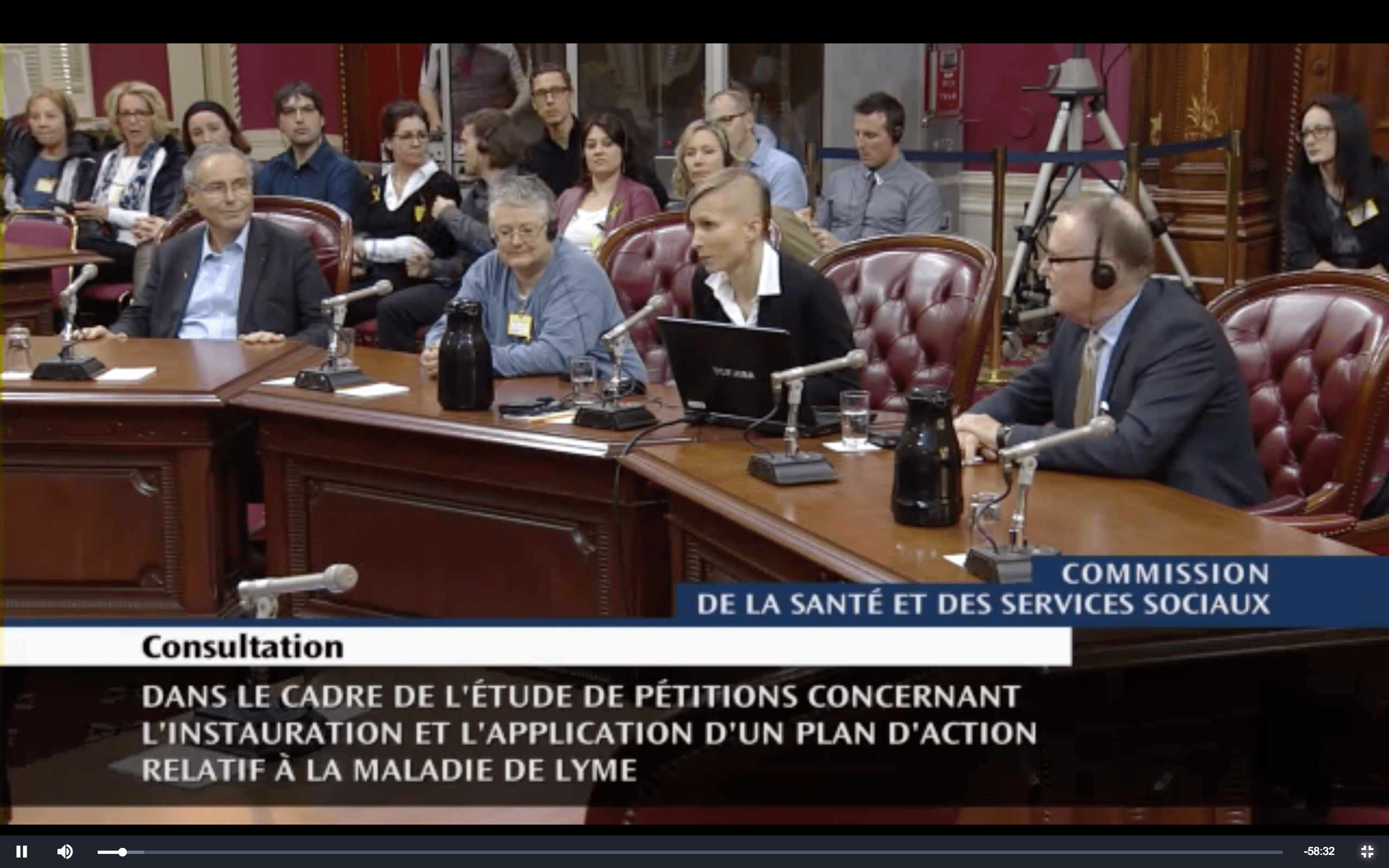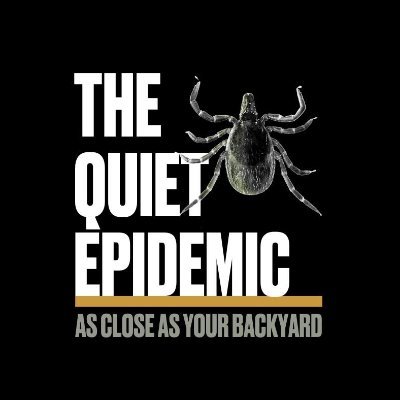13
May
2018
Official reaction of AQML to the CSSS Report

On April 11, the Commission of Health and Social Services of the Quebec National Assembly released its report following public hearings held on March 22 regarding Lyme disease. Follow this link to read AQML’s official response to the report, or read the text below.
Sunday, May 13, 2018
Subject: Official Response of the Association québécoise de la maladie de Lyme (AQML) to the Report Published by the Commission of Health and Social Services (CSSS) Following the Review of Petitions Regarding the Implementation and Enforcement of a Lyme Disease Action Plan.
1. Chronological recap
On February 7, 2018, two petitions totaling more than 9,000 signatures were submitted to the National Assembly by Sylvain Pagé, the Parti Québécois Member of Parliament for Labelle. On February 20, the Commission of Health and Social Services (CSSS) decided to address the matter, and on March 22, public hearings were held. The National Institute of Public Health (INSPQ), the Director of Public Health (DNSP), and the College of Physicians of Quebec were invited to participate. Thanks to Mr. Pagé’s intervention, the Association québécoise de la maladie de Lyme (AQML) was also invited to the hearings, accompanied by a delegation of three experts: Prof. Christian Perronne, Prof. Vett Lloyd, and Dr. Ralph Hawkins. Upon learning that Prof. Perronne would be present, the Commission decided to grant him an additional hour for his presentation. The College of Physicians declined the deputies’ invitation and deemed it unnecessary to attend the hearings. On April 11, 2018, the CSSS report on the public hearings was published on the website of the Quebec National Assembly (ANQ).
2. Acknowledgements
We sincerely commend the efforts of Member of Parliament Sylvain Pagé and all the deputies who facilitated the handling and study of this issue. We were moved by the relevance of their questions and comments, as well as by the attentive listening they demonstrated, from all political parties.
3. Presentation at the public hearings
Through the presentations by its invited experts, AQML demonstrated that current medical science has evolved significantly over the past decade. While the College of Physicians still relies on the guidelines of the Infectious Diseases Society of America (IDSA), which were developed based on scientific studies published before 2006, the Association informed the deputies that the U.S. Centers for Disease Control (CDC) withdrew these guidelines in 2017, as they were deemed obsolete by the Institute of Medicine. By maintaining the status quo, Quebec’s medical authorities continue to use unreliable tests, depriving many Lyme disease patients of appropriate treatment. Meanwhile, in other parts of the world, recognized new protocols are in use, and the invited experts were able to testify to this. AQML also presented the results of a survey conducted among its members, revealing the poor state of care for Lyme patients in Quebec, as well as the physical, psychological, and financial suffering that stems from this situation. The members of the CSSS were very surprised, even shocked, to learn that they had never heard of these facts before.
4. AQML’s requests and our comments on the report
First request from AQML: The official recognition of chronic Lyme disease and co-infections as a serious condition and an urgent public health issue.
Comments: The Association views the conclusions and recommendations of the CSSS report as a step forward toward the official recognition of chronic Lyme disease and its co-infections. The report indicates that the deputies have undergone a major awakening regarding the severity of the situation and now consider it a genuine public health issue. Moreover, in light of the expert testimonies and all the scientific literature cited in AQML’s brief, there is no longer any doubt among them that Lyme disease does indeed exist in its chronic stage. They are convinced that this is an observable and scientifically verifiable reality.
However, while this report signals a shift towards change, AQML demands official recognition from the medical authorities of our province of Lyme disease and co-infections, including the chronic stage, as a serious and sometimes debilitating illness. This crucial point has yet to be achieved and is fundamental to ending the medical mismanagement experienced by those affected.
Second request from AQML: Legal protection for physicians providing care based on more effective globally recognized protocols, including the prioritization of clinical diagnosis.
Comments: It is important to note that the current protocol guidelines (IDSA), on which Quebec’s medical authorities rely, have been subject to official criticism, disputes, and legal actions worldwide. In fact, a dozen U.S. states have passed laws protecting doctors who use long-term antibiotic therapy to treat Lyme disease. Given that changing the guidelines in Quebec may take several years, and that currently, the prescription of prolonged antibiotics can only occur in a research context, AQML considers legal protection for doctors to be a top priority. This is also a temporary, simple, and non-disruptive solution for the medical system, allowing doctors the freedom to treat patients while developing expertise. Health professionals wishing to do so would have the right to practice outside current guidelines without fear of reprisal from the College of Physicians. We believe this is the most effective way to achieve concrete and quick results in terms of patient care, following a model already in use elsewhere.
It is with disappointment that we observe no recommendations were made in this regard, despite the proposal by MP Pagé. However, we warmly welcome the initiative of MP and infectious disease specialist Dr. Amir Khadir, along with his CSSS colleagues, to write a letter to the College of Physicians asking “not to hinder doctors who, out of frustration, initiate trial antibiotic treatments for patients presenting with low-level chronic infection symptoms.” AQML strongly supports this statement and notes that France has already made progress in this direction.
Third request from AQML: The establishment and implementation of a concrete action plan to address Lyme disease and its complications, in close collaboration with AQML, our experts, and our members.
Comments: The INSPQ and the DNSP acknowledge that the current patient care protocol is “improvable.” The government has tasked the INESSS with reviewing the diagnostic and therapeutic process in place, and the report is expected in the spring of 2019. The CSSS report states that “the members consider it relevant for AQML to be closely involved in the INESSS work and for the scientific literature highlighted by Prof. Perronne and Dr. Hawkins during the hearings to be taken into account.”
In his testimony, Dr. Hawkins demonstrated that the current two-tier screening protocol misses two-thirds of infected individuals, and that other tests available in Europe are much more accurate and sensitive. Prof. Perronne emphasized that the clinical examination is fundamental, and since we will not have foolproof serological tests in the coming years, the solution for now is to advocate for trial treatments, which are officially used for many other infectious diseases. Moreover, in France, the new national protocol for Lyme disease diagnosis and care is set to be released in the coming days. The CSSS members strongly recommended that public health officials take this into consideration.
Let us also recall that our brief included 14 proposed solutions, which the DNSP committed to reviewing. Additionally, the DNSP had promised to get in touch with the Association, but that call is still awaited. On his part, MP Pagé requested a report on the applicability of these solutions and urged Finance Minister Carlos Leitao to allocate funds in the 2018 budget to deliver recommendations aimed at implementing a Lyme disease action plan.
AQML stresses that it is high time for the Ministry of Health, INESSS, INSPQ, DNSP, and the College of Physicians to embrace the latest scientific findings on Lyme disease and set aside the institutional bias they have shown for decades. The hearings revealed that these institutions favor maintaining the status quo and avoid taking responsibility for making tangible changes for those affected. An action plan that does not revise the current screening and treatment guidelines in our province, which the U.S. CDC deems outdated and which have been the subject of strong warnings from the European CDC, cannot be considered acceptable by AQML.
5. Comments on the report’s recommendations
First recommendation: That the Ministry of Health and Social Services launch a public awareness campaign on Lyme disease, its causes, symptoms, and prevention methods by the summer of 2018. This campaign should specifically target at-risk populations, and the Ministry should provide a report on the communication strategy implemented to the Commission of Health and Social Services no later than December 31, 2018.
Comments: AQML welcomes this recommendation but emphasizes that the previous awareness campaign spread misinformation to the public. For example, it is incorrect to claim that a tick only begins transmitting bacteria after 24 hours of attachment to the skin. This information is not scientifically supported, and some studies show that transmission can occur as early as 6 to 8 hours. Co-infections are rarely mentioned, and there is an overemphasis on the erythema migrans rash, which does not appear in all cases. AQML urges public health officials to consider the scientific literature we presented during the public hearings when developing the content for this awareness campaign.
Additionally, it is important to remember that by 2020, 80% of Canada’s population will live in areas where ticks are established. We recommend that public health begin planning additional awareness strategies for the population in the coming years. It should also be noted that this recommendation does not provide any immediate help for those already affected by Lyme disease and in need of urgent care.
Second recommendation: That the Ministry of Health and Social Services, in partnership with the National Institute of Public Health, promptly enhance the training program for healthcare professionals on the various forms of Lyme disease, its diagnosis, and its treatment.
Comments: The content of this training was developed before the public hearings, which took place before the deputies recognized that this is truly an urgent public health issue. All doctors should now be aware that ticks are present throughout Quebec and that the risk of contracting Lyme disease and its co-infections is very real. The DNSP has committed to considering the scientific references presented by AQML and its experts. Furthermore, at the invitation of the deputies, Prof. Perronne stated that he is available to collaborate with Quebec’s public health authorities.
When comparing the current training content with recent literature, it is clear that the entire content needs to be reviewed, and new scientific data on diagnosis and treatment must be added as soon as possible. Currently, the training asserts that two-tiered tests are reliable, even though further research is needed to improve them, that they meet the standards of the U.S. and European CDCs, that chronic Lyme disease is not a scientifically proven condition, and that current short-term treatments are still effective in eradicating the bacteria. These statements are entirely false, according to recent scientific studies and the testimonies of Dr. Hawkins and Prof. Perronne at the Assembly.
It is also worth noting that our members report that several medical specialists consider this severe immune system disorder to be a “trendy” disease. This type of prejudice must end, and one way to achieve this is through training based on recent scientific data, which will better equip doctors to recognize the signs and symptoms of this disease, often referred to as the “great imitator.”
Third recommendation: That the Ministry of Health and Social Services annually inform, for the next three years, the Commission of Health and Social Services and the Association québécoise de la maladie de Lyme of the steps and actions taken following the various conclusions and recommendations of the Commission, including the new treatment modalities for the chronic form of the disease and the research component, according to the standards set by the National Institute of Excellence in Health and Social Services (INESSS).
Comments: AQML and its members appreciate being officially informed of the actions that will be taken by the Ministry of Health and Social Services. However, we will not be content to wait for the annual report to take action. AQML intends to actively participate in this process of change toward new guidelines. The members of the CSSS have repeatedly recommended to the DNSP and the INSPQ the importance of collaborating with AQML, its members, and its experts, taking into account the years of experience these clinicians have in diagnosing and treating the severe form of Lyme disease, as well as all the new scientific and medical literature presented to the Commission.
AQML, its members, and its experts are now recognized as key stakeholders in this issue, and the Association intends to take its rightful place in this transition process toward new guidelines. Regarding the research component, which is highly important, we all agree that serious investment in this area is necessary, starting now. The recent $15 million donation from a private foundation to McGill University for research on infectious diseases could be an important step in this direction. AQML urges the DNSP to intervene to ensure that a relevant research project, focused on the needs of patients, is initiated through this opportunity, allowing for a thorough study of the effectiveness of prolonged antibiotic therapy.
6. Conclusion
In several countries around the world, actions are being taken by associations of affected individuals, and the truth is coming to light regarding the current global scandal. The UN has declared this situation a violation of human rights. In France, Lyme disease is now recognized as an occupational illness, and clinical diagnosis is an accepted foundation. In the United States, legal actions are being taken against the outdated guidelines, and in Germany, these guidelines have been rejected for over a decade. In Quebec, the discrimination against sick individuals based on negative serology results, coupled with the refusal to provide treatments that could greatly improve their quality of life, is an outrageous situation. Urgent concrete actions must be implemented to care for all patients affected by Lyme disease and its co-infections. The refusal of medical authorities to recognize this severe immune system disorder as a chronic and potentially disabling disease leads to serious consequences, such as difficulty accessing social services, isolation, misunderstanding from family and friends, inability to obtain financial support from the government, the need to seek appropriate antibiotic treatment outside the province, and, in turn, the obligation to conceal one’s health condition and treatment. There is also the added stress of protecting a Quebec-based doctor who dares to treat outside of the guidelines. These elements can literally endanger people’s lives, if they aren’t already in danger, considering the severity that the symptoms can reach. All the controversy surrounding the disease causes incredible distress for those affected. The question is whether Quebec’s medical authorities and government will ultimately decide to become a global leader in the care of citizens affected by Lyme disease or if they will simply follow decisions made in other countries, allowing their citizens and taxpayers to suffer in the meantime.
AQML intends to continue applying pressure on government and medical authorities. It will not accept that the recommendations remain empty promises and will persistently fight until the government takes legal action to protect the fundamental rights of its citizens to receive adequate healthcare, and until medical authorities decide to provide care based on the latest scientific data. During the public hearings, the veil was lifted on years of suffering and silence experienced by our members. In light of the CSSS report, continuing to dismiss these concerns as quackery, as some doctors have done in recent years, would be an act of bad faith.
Let us remember that currently, it is nearly impossible for individuals in the severe stages of Lyme disease to receive proper care in our province, leading to a profound sense of despair, with 58% of patients contemplating suicide. The government, along with the Minister of Health, INSPQ, INESSS, DNSP, and the College of Physicians, have the responsibility to act in order to protect the fundamental right to access healthcare and to prevent the tragedies that could result from the prolonged inaction that has persisted in Quebec for years. Minister Gaétan Barrette, during his press conference on February 7, made a commitment by saying: “And I can tell you one thing, I can even make a promise here, that if somewhere there was something that was the result of evidence-based treatment, a diagnosis, a diagnostic method… we would look at it and implement it…” We took him seriously, we brought experts to Quebec, we provided evidence. Now, it is up to him to act and uphold his commitment.



